WASHINGTON, D.C. -- As Venezuelans head to the polls Sunday to choose the late President Hugo Chavez's successor, the former leader's memory looms large. Gallup data collected in Venezuela and worldwide since 2006 provide insights into how Venezuelans and people worldwide felt about Chavez and the state of the country he left behind and the implications these findings could have on the election.
Quick Summary: Chavez's approval ratings were relatively high (57%) before he died, but Venezuelans saw their country deteriorating in several ways, particularly in terms of corruption and safety. This growing disfavor could convince Venezuelans to back the anti-Chavez candidate, Henrique Capriles, over acting leader and close Chavez confidante Nicolas Maduro.
During his 14-year run as president, Chavez promoted a socialist agenda that aimed to increase the state's role in the economy and implemented antipoverty measures in a nation riddled with financial hardship. Chavez's domestic and international critics saw his governing style as increasingly dictatorial, viewed him as unable to deal with the country's core problems, and considered his hostility toward businesses threatening to the Venezuelan economy.
Whether Venezuelans sympathize with Chavez and his disciples' vision of "21st century socialism" or his detractors' criticism will likely determine the outcome of the upcoming election.
Views of Chavez's Leadership: In 2012, the last full year of Chavez's presidency, the leader enjoyed a 57% approval rating, among the highest Gallup found during his last six years in office.
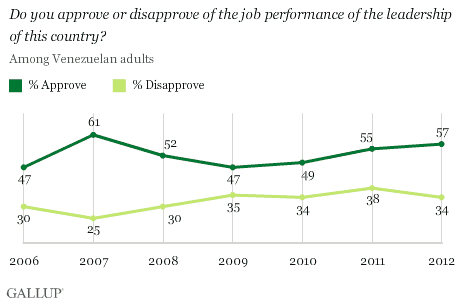
Chavez was a controversial leader on the world stage, and his bombastic style as well as his leftist ideology attracted admirers and enemies alike. Across Latin American and Caribbean countries surveyed, Chavez's government received a median 20% approval rating in 2012. Haiti, a recipient of Venezuelan oil, registered the highest approval, at 58%, while Brazil had the lowest approval of 8%.
Venezuelans Perceive More Corruption in Business: During Chavez's tenure, he nationalized more than 1,000 companies, but this does not appear to have positively influenced Venezuelans' views of their country's businesses.
In 2012, nearly three-quarters (73%) of Venezuelans said corruption was widespread in businesses, up from 56% in 2007. This upward trend also stands in stark contrast to other Latin American countries run by more market-friendly governments such as Brazil and Mexico, where the percentage of residents judging businesses as corrupt has steadily declined over the same time period.
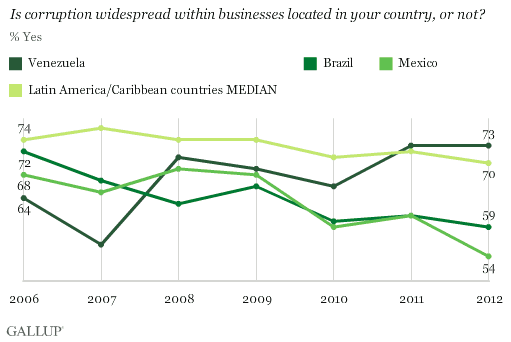
Majority Satisfied With Chavez's Efforts to Deal With Poverty: Six in 10 Venezuelans in 2012 said they were satisfied with the country's efforts to deal with the poor, an objective of Chavez and his administration. Maduro has tried to identify with the poor and stressed his own working-class background throughout his campaign. Interestingly, the percentage of Venezuelans satisfied with the country's efforts to deal with the poor tracks closely to Chavez's overall approval rating, suggesting that this issue could be important to many residents. Noticeably, both metrics shot up in 2007 and 2012, years Chavez stood for re-election and, perhaps not coincidentally, dramatically increased public spending, including a 67% increase in government spending ahead of the 2012 election.
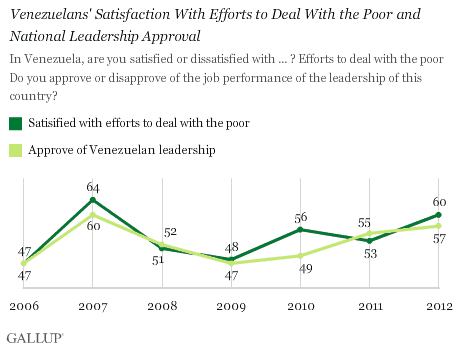
Venezuelans Saw Chavez Government as Corrupt: Chavez's critics in Venezuela depicted him as a near-tyrant with a record of cronyism. In fact, the government became much larger and more powerful during Chavez's rule, and large majorities of Venezuelans saw it as corrupt in his final six years. In 2012, 63% of Venezuelans believed there was corruption in government, similar to the 68% who said so in 2011. This would seem to support the opposition's narrative that Chavez ran a corrupt, unaccountable government. Chavez also made combatting corruption a major plank of his platform in his original campaign for office, indicating much of the country believes his government failed to deliver on this objective. However, this failure does not seem to have had much impact on Chavez's overall popularity.
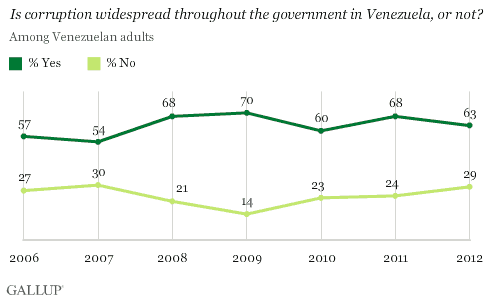
However, the perception of government corruption is not unusual for Latin American and Caribbean countries, most of which have large majorities stating their country's government is corrupt. With 39% saying they believe corruption is widespread in their government in 2011, the most recent observation, Uruguay stands as the exception in the region and the only Latin American/Caribbean country to have a majority of its residents saying corruption is not widespread in the entire history of the question.
Venezuelans' Faith in Elections and Media Intact: If Chavez was granting himself an excessive amount of authority over the election system -- as his opponents claim -- many Venezuelans did not seem to notice. In 2012, 59% of the country believed in the honesty of elections, a record high, and a propitious number for a country about to embark on a new set of elections. And, 66% said the media has a lot of freedom -- equal to the median for Latin American and Caribbean countries. The 66% saying the media has a lot of freedom in Venezuela also represents an increase from 2011, when 58% of Venezuelans said the same.
However, the role of the media in national campaigns is once again coming under scrutiny. Maduro's television advertisements have broadcasted much more often than those spots supporting Capriles; in fact, Capriles is afforded only one 30-second ad per day. Meanwhile, Capriles has accused the military of assisting the government in helping to churn out voters.
Safety Still Significant Issue: Both candidates have pledged to take on Venezuela's crime problems for clear reasons. Compared with the rest of the region, Venezuela is unique in the relatively high percentage of residents who do not feel safe walking alone at night. In 2012, 74% of adults said they felt unsafe walking alone at night, far higher than in any other Latin American country -- a region where residents feel less safe than in any other regions of the world -- and one of the highest measurements in all of the 160 countries where Gallup surveys. Moreover, this figure has remained remarkably high over the past six years, suggesting a failure by the Chavez government and the need for whomever his replacement is to address this important issue.
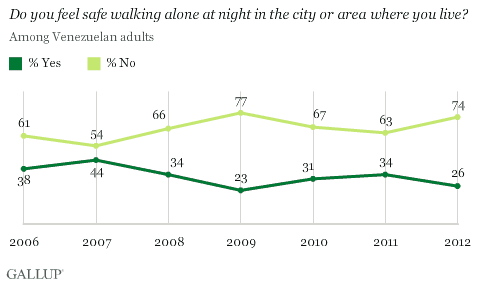
Implications: Venezuelans face a major choice on Sunday: install the political followers of Hugo Chavez, or opt for a different direction. In many respects, Gallup's data suggest that the Venezuelan public is conflicted in terms of Chavez's legacy. While Venezuelans were satisfied with Chavez's efforts to alleviate poverty and largely did not appear to agree with the view that he was curtailing media freedom or rigging elections, most saw his government as corrupt and perceived a significant breakdown in public safety.
However, at the time of Chavez's passing, he was a popular president, and it is likely his death has only compounded that popularity. This means that opposition candidate Capriles has a tall task in defeating Maduro, but not an impossible one.
For complete data sets or custom research from the more than 150 countries Gallup continually surveys, please contact us.
Survey Methods
Results are based on face-to-face interviews with about 1,000 adults, aged 15 and older. Surveys were conducted in November 2005, December 2006, August 2008, July 2009, July 2010, November 2011, and September 2012 in Venezuela.
For results based on the total sample of national adults, one can say with 95% confidence that the margin of error ranges from ±3.2 to ±4.1 percentage points. Results presented by subgroup would have a higher margin of error. The margin of error reflects the influence of data weighting. In addition to sampling error, question wording and practical difficulties in conducting surveys can introduce error or bias into the findings of public opinion polls.
For more complete methodology and specific survey dates, please review Gallup's Country Data Set details.
